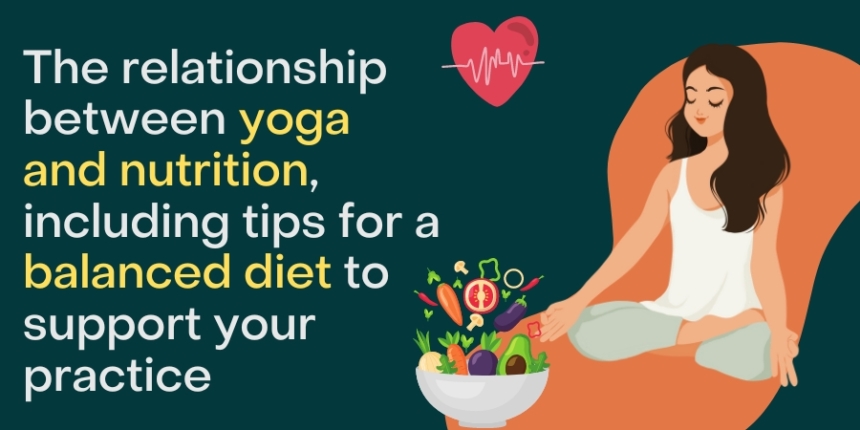The relationship between yoga and nutrition, including tips for a balanced diet to support your practice
By Himanshu JoshiYogahealth, healthy foods, healthy life, nutrition, yoga, yogic dietNutrition is an intrinsic part of Yogic practices. The food we eat can have a profound impact on not only our body but mind also. Eating a well-balanced diet with sufficient nutrients is essential for maintaining energy levels, building strength and endurance, and supporting muscle recovery. Yoga and Ayurveda recommend inclusion of Sattvic foods in the daily diet which are light and healthy in nature. Foods that are vegetarian, high on antioxidants, vitamins, minerals, and freshly made are believed to work wonders for your energy levels, happiness, calmness, and bring mental clarity. Such diet also works appropriately for building stamina and flexibility to perform Yoga asanas with ease. It also helps in enhancing focus which is important for achieving the meditative state.
GUT-BRAIN CONNECT
Yoga is as much about the body as it is about mind. The right diet can bring us in the right frame of mind. We have trillions of microbes in our gut microbiota that regulate various body functions. Scientific studies have established that there is a great connect between our gut and our brain. The gut-brain axis refers to the interaction between the gut and the brain. This involves multiple complex pathways and mechanisms.
One of key functions of the gut-brain axis is its role in digestion and nutrient absorption. The gut and the brain communicate through the enteric nervous system, which is often referred to as the ‘second brain’ due to its ability to operate independently of the central nervous system. This communication helps to regulate digestive processes such as enzyme secretion, gut motility, and nutrient absorption.
YOGA AND NUTRITION RELATIONSHIP
Nutrition can play a big role in keeping chronic diseases away. While we understand the importance of a healthy diet, we often crave for unhealthy foods to regulate mood swings and manage stress. We tend to munch mindlessly under stress and before we realise the entire box of cookies or a bag of chips goes into our system and begin to wreak havoc with our stress levels even more. This is a vicious cycle.
The more we eat junk food, the craving for unhealthy stuff becomes more intense. The hidden sugar and salt content in these items can over the period of time make us obese and susceptible to many lifestyle diseases. Yoga can help support healthy eating habits. By reducing stress and promoting mindfulness, yoga can help individuals become more attuned to their bodies and make better food choices. Yoga can also aid in digestion and improve metabolism, which can help the body better process nutrients and maintain a healthy weight.
WHAT IS A BALANCED DIET
Eating a balanced diet which means including all the essential food groups can have a magical effect on your health. From improved concentration levels, to reductions in aches and pains, to enhanced immunity, better moods, healthy weight to an overall sense of well-being, eating better can bring a revolutionary change in your life. A balanced diet provides all the essential nutrients that the body needs to maintain optimal health and well-being. A balanced diet should include a variety of different foods from all the major food groups in the right proportions.
For example carbohydrates provide energy to the body and the healthy sources of carbs include whole grains, fruits, vegetables, and legumes. Protein is essential for building and repairing tissues and should make up around 10-35% of the total calorie intake. Sources of protein include dairy products, beans, and legumes. A balanced diet should also include healthy fats such as nuts, seeds, avocados, and ghee. However, the intake of saturated and trans fats found in processed and fried foods must be limited. For good health, one must also include a variety of vitamins and minerals that the body needs to function properly.
TIPS FOR BALANCED DIET
START YOUR DAY RIGHT
Do you start your day with a cup of tea or coffee? You may not be doing justice to your digestive system. In some people it can stimulate production of stomach acids and cause stomach irritation, acid reflux, and in some cases, stomach ulcers. On the other hand, having fresh fruits, soaked nuts, lemon-honey water, smoothies, yoghurt, in the morning can give the right nutritional boost to your system.
GO FOR FRESH UNPROCESSED FOODS
Give your bread, corn flakes, ready-to-eat upma a break and go for unprocessed foods that are not only rich in nutrients but also tend to be more filling. Eating whole grains or fresh food will make sure you will feel full and energetic and be able to maintain a healthy weight. Choose fresh fruits and vegetables, whole grains, lean proteins, and healthy fats such as nuts, seeds, and avocados.
EAT WARM MEALS
In Ayurveda, warm meals are recommended for a variety of reasons including improved digestion, better agni or digestive fire, balancing doshas and releasing stress. This is because warm foods are easier to digest than cold foods. Eating warm foods can help stimulate the digestive system, improve the absorption of nutrients, and prevent digestive problems like bloating, gas, and constipation. In Ayurveda, the three doshas namely vata, pitta, and kapha are believed to govern various aspects of the body and mind and eating warm foods is believed to help balance the doshas, particularly vata and kapha, which can become imbalanced by cold and raw foods.
CONTROL PORTION SIZE
While balanced diet is important for good health, eating too much of even healthy foods can lead to weight gain. Eating mindfully or portion control helps ensure you’re getting the right amount of nutrients while maintaining a healthy weight. A general rule is to fill half of your plate with vegetables, a quarter with protein, and a quarter with whole grains.
PLAN YOUR MEALS
In our hectic lifestyle, we sometimes resort to eating a single food group or junk food as we do not have time to cook nutritious meals. Planning in advance can cut preparation time significantly, enabling you to cook your meals in a short time. Plan your meals in advance to ensure you’re getting a variety of nutrients and avoiding unhealthy foods. This can also help you save time and money by reducing the need for takeout or fast food.
EAT HEALTHY FATS
Fats have gained a bad reputation over a period of time due to its role in increasing cholesterol. Not all fats are bad and it’s only saturated or trans fats you need to avoid. Including healthy fats can in fact help cut cholesterol levels and nourish your body and mind. Healthy fats, such as those found in nuts, seeds, avocados, and butter are essential for good health. Try to incorporate these foods into your diet regularly.
STAY AWAY FROM SUGARY, PROCESSED FOODS
Sugar-laden and high-calorie deep fried stuff is not just tasty but also addictive. Eating them rewards pleasure centres in your brain, which can make you consume them in large quantities. However, they play havoc inside our body. They are digested quickly and raise blood sugar levels. They also lead to mood swings. Processed and sugary foods are also often high in calories and low in nutrients, which can lead to weight gain and chronic health problems. Try to limit your intake of these foods as much as possible.
DRINK LOADS OF WATER
Drinking 7-8 glasses of water can fix many health issues and promote overall well-being. Drinking enough water helps ensure that the body is properly hydrated, which is essential for many bodily functions, including regulating body temperature, transporting nutrients, and removing waste products. Staying well-hydrated can help improve the appearance of skin by reducing the risk of dryness, flakiness, and acne.
Water is also essential for the functioning of the immune system, which helps protect the body against infection and disease. Additionally, drinking enough water can help prevent constipation. Drinking plenty of water is thus essential for good health. Aim for at least 8 glasses of water per day, and avoid sugary drinks such as soda and juice.
PAY ATTENTION TO YOUR BODY SIGNALS
While there are certain universal rules to good nutrition, every individual is different and it is best to pay attention to your body signals and eat the food accordingly. In Ayurveda, ‘prakriti’ refers to an individual’s unique physical and psychological constitution, which is determined by a combination of three doshas (vata, pitta, and kapha). According to Ayurveda, each person has a unique prakriti, and understanding one’s prakriti can help guide dietary choices and promote overall health and well-being.
Those with a vata-dominant prakriti may benefit from warm, grounding foods that help balance the light and airy nature of vata, while those with a pitta-dominant prakriti may benefit from cooling, calming foods that help balance the heat and intensity of pitta. Ayurveda places a strong emphasis on digestive health, and understanding one’s prakriti can help identify foods and eating patterns that support optimal digestion.
Those with a kapha-dominant prakriti may need to avoid heavy, oily foods that can lead to sluggish digestion and weight gain. Pay attention to how your body feels after eating certain foods, and adjust your diet accordingly. If you feel bloated, tired, or sluggish after a meal, try to identify the culprit and avoid it in the future.
YOGIC RECIPES FOR OPTIMUM HEALTH
KHICHDI
Khichdi, a popular dish with health enthusiasts is traditionally recommended in Ayurveda as it is easy to digest and helps balance all three doshas. To make it, combine equal parts of mung daal and basmati rice with ghee and spices like cumin, coriander, and turmeric. Add water and cook until the ingredients are soft and well-cooked.
GOLDEN MILK
This drink originated in India but the popularity of Golden milk or haldi doodh has now spread worldwide and it is even touted as one of the super foods for good health. It is a popular Ayurvedic drink that is known for its anti-inflammatory properties. To make it, warm a cup of milk with a teaspoon of turmeric powder, a pinch of black pepper, and a teaspoon of honey. You can also add other spices like cinnamon and cardamom for added flavour.
VEGETABLE SOUP
A storehouse of micro-nutrients, vegetable soup is a great way to nourish yourself and boost your immunity. To make it, chop onion, garlic, ginger, and spices like cumin and coriander in ghee or oil. Add chopped vegetables like carrots, beans, bottle gourd and cover with water or vegetable broth. Cook until the vegetables are tender and well-seasoned.
MASOOR DAL
Light and easy to digest, masoor dal is considered one of the best lentils for digestion purpose. To make it, cook masoor dal with water, turmeric, and salt until the lentils are soft. In a separate pan, sauté onion, and spices like cumin and coriander. Add the cooked lentils to the pan, along with chopped tomatoes, and simmer until well-infused.
SAMBAR
Sambar is a South Indian preparation that is teamed with dosa, idly, uttapam or rice and is packed with nutrients. To make it, cook toor dal with water, turmeric, and salt until the lentils are soft. In a wok, sauté onion, garlic, ginger, and spices like cumin, coriander, and mustard seeds. Add chopped vegetables like eggplant, okra, and tomatoes, and cover with water or vegetable broth. Cook until the vegetables are tender and well-seasoned.
COCONUT CHUTNEY
Coconut chutney is a South Indian side dish that is made with coconut, lentils, and spices. To make it, grind fresh or desiccated coconut, roasted chana dal (split roasted gram), green chillies, ginger, and salt to a smooth paste. Add water as needed to get the desired consistency.
BUTTERMILK
An essential probiotic to enhance gut health, this Ayurvedic drink is ideal to have in summer. You need a cup of milk and a bit of lemon juice to make it. Pour the milk into a measuring cup or bowl. Add the white vinegar or lemon juice to the milk and stir to combine. Let the mixture sit at room temperature for 5 to 10 minutes. The milk will thicken and curdle. After 5 to 10 minutes, your buttermilk is ready to use.






